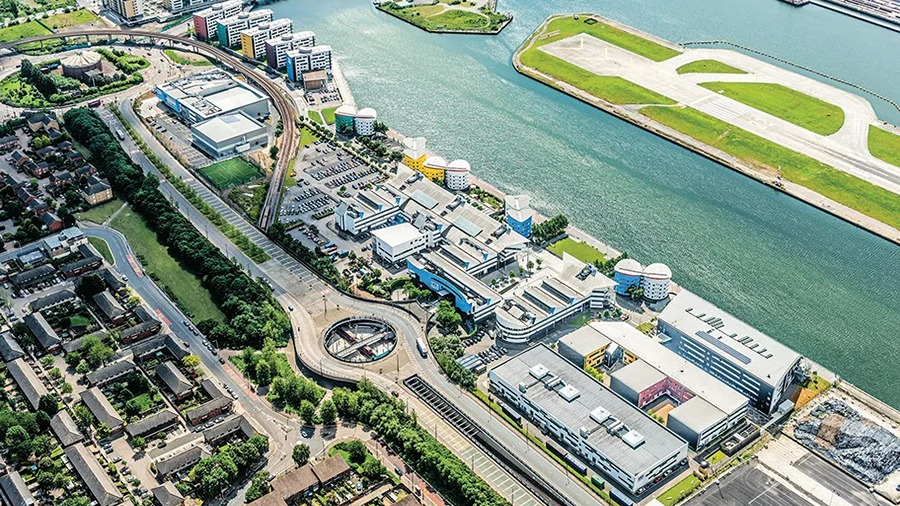
ZUG, Switzerland, Mar 18, 2025 – The University of East London (UEL) has expanded its partnership with Siemens Smart Infrastructure by signing a new contract. Siemens will design and install a Water Source Heat Pump (WSHP) to support UEL’s goal of creating a net zero campus. This WSHP will be the largest installed at any university in the UK. It will power the Docklands Campus Library and the Royal Docks Centre for Sustainability buildings, replacing the current gas boilers.
Submerged in the River Thames, the closed-loop system will use a series of pipes to extract natural heat from the water in the Royal Albert Docks, providing a cost-effective heating system reducing annual CO₂ emissions by 258 tons without removing vast quantities of water from the river. The system is scalable to allow the university to extend similar heat pump systems across the campus and the wider Docks in the future, which is the only Enterprise Zone in London. The project is part of a long-term partnership with Siemens, supporting the university’s transition to net zero by 2030.
Compared to other London universities, UEL has reduced CO₂ emissions and energy use from carbon sources. It aims to achieve the lowest emissions per student in the UK by 2026. As well as saving the university over £500,000 per year in utility costs and reducing emissions by over 1,000 tons annually, it has driven a unique range of successful green employability, enterprise, and research initiatives, including student internships, MSc sponsorships, hackathons, and the creation of a ‘Living Lab’ for training and research on sustainability. The project supports the Mayor of London’s vision for a greener, sustainable capital, advancing his commitment to cleaner air, renewable energy, and achieving net zero by 2030.
Mayor of London, Sadiq Khan, said, “London is leading the way in the fight against climate change, and projects like this pioneering partnership between the University of East London and Siemens are key to our city’s transition to a greener, more sustainable future. By harnessing the power of the River Thames to heat university buildings, this initiative demonstrates how innovation and collaboration can drive real progress towards net zero. It not only reduces carbon emissions but also sets a powerful example of how London’s institutions can embrace cutting-edge, clean energy solutions to build a better, fairer, and greener city for all Londoners.”
UEL vice-chancellor & president, Professor Amanda Broderick, said, “We are committed to driving forward sustainable innovation that not only reduces our environmental impact, but also creates a living laboratory for the next generation of climate leaders. This Water Source Heat Pump demonstrates how universities can be at the forefront of the green energy transition, harnessing our natural surroundings to drive real change. Through our strategic partnership with Siemens, we are accelerating towards our 2030 net zero targets, delivering cutting-edge solutions that will benefit all the communities we serve, and the planet.”
Constantin Ginet, executive vice president of sustainability at Siemens Smart Infrastructure Buildings, added, “The collaboration is a great example of how academia and the private sector can work together to achieve sustainability targets. Leveraging data is key when aiming to better understand buildings and energy consumption. And this long-term partnership demonstrates how data creates the basis for gaining more confidence in deploying large-scale tech.”
The partnership, which was formed in 2022, has already seen Siemens deploy many decarbonization technologies, including solar photovoltaic, building management systems, the digital building platform Building X, and electric vehicle charging infrastructure across the campus.
Source: Siemens
About Siemens Smart Infrastructure (SI)
![]()
Siemens Smart Infrastructure (SI), headquartered in Zug, Switzerland, is a division of Siemens AG that focuses on intelligently connecting energy systems, buildings, and industries to enhance the way we live and work. SI offers a portfolio of across-the-board building automation systems, heating, ventilation, air conditioning (HVAC) controls, fire safety and security systems, energy performance services, grid resilience solutions, and electric vehicle charging infrastructure. Serving sectors such as data centers, energy, and various industrial applications, SI addresses the challenges of urbanization and climate change by providing innovative solutions. In fiscal year 2024, SI achieved a profit margin of 17.3%. The division employs approximately 78,500 people globally.
About Siemens AG
![]()
Siemens AG, headquartered in Munich, Germany, is a technology powerhouse with a history dating back to 1847. The company operates in sectors including industry, infrastructure, transport, and healthcare, offering products and services that range from industrial automation and digitalization solutions to energy-efficient technologies and medical diagnostics equipment. In the fiscal year 2023, Siemens reported revenues of €77.8 billion and a net income of €8.5 billion. The company employs over 300,000 individuals worldwide, with approximately 87,000 based in Germany. Siemens is recognized as a leading industrial manufacturing entity in Europe and holds a significant position in the global industrial automation and software market.
About The University of East London (UEL)

The University of East London (UEL) is a public university in the London Borough of Newham, England, with campuses in Stratford and Docklands. UEL offers over 160 undergraduate and 120 postgraduate programs across various disciplines, including architecture, computing, engineering, arts, education, health, sports, bioscience, psychology, business, and law. The university serves diverse industries by preparing students for careers in biomedical science, architectural design, finance, and more. As of the current academic year, the University of East London (UEL) enrolls approximately 19,550 students. The university employs over 1,500 staff members from 67 countries. Financially, UEL contributes £814 million annually to the UK economy, supporting 3,545 jobs nationwide, including 2,130 in London. UEL’s mission focuses on being a career-led university, preparing students for future jobs, and fostering positive change.
